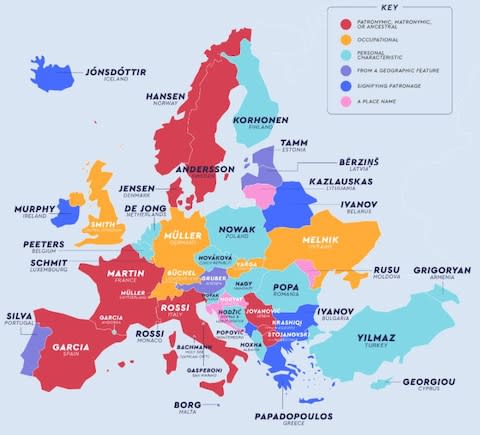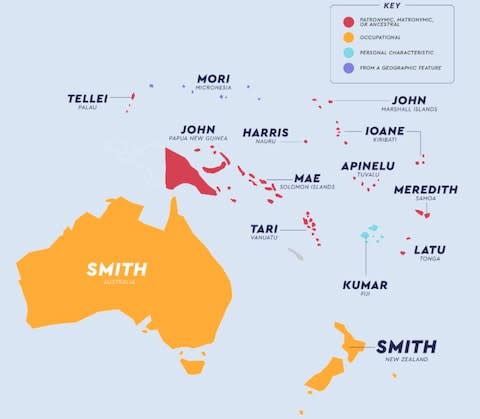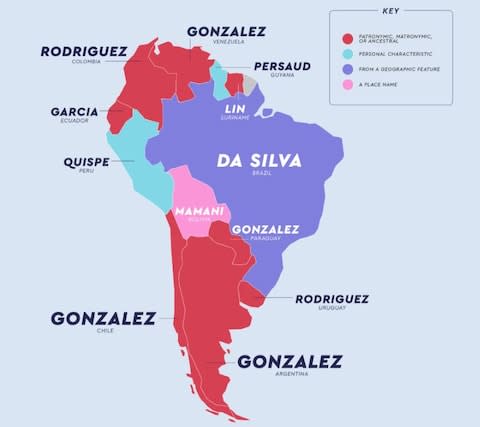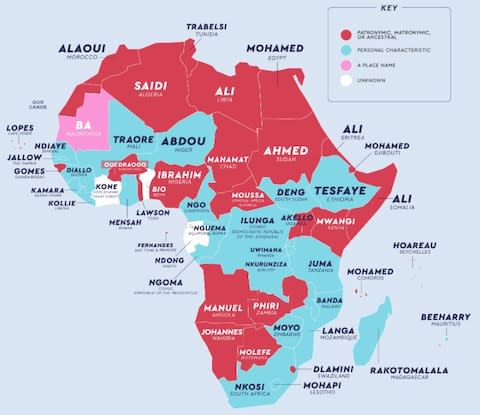How 'Smith' is still the most common surname in every English-speaking former colony

When the British turned up to conquer the likes of Australia, Canada and the US, they brought their surnames with them. Centuries on, Smith remains the most common last name in all of the above.
Indeed, across the United States it is shared by one in every 121 residents. And it has long been the most prevalent surname in the UK where it first originated (just ask Telegraph Travel's digital editor Oliver Smith, who has the most boring name in Britain).

Smith derives from 'blacksmith', a popular trade throughout much of human history. In Luxembourg, too, the most common surname is 'Schmit', which derives from the Middle High German 'smit', again meaning 'blacksmith'.
We didn't always use last names - according to onomastics, the study of such things. The practise is thought to have first developed in ancient China, around 2852BC, as a way of collecting census data on its population. The most common surname there today is Wang.
In Western Europe, this habit did not emerge until the Middle Ages, when the continent's population was spreading, record-keeping improving, and we needed a way to tell each other apart.

Compared to the rest of the world, as displayed in the following maps created by NetCredit, Europeans are still much more likely to have monikers related to an ancestor's occupation. But all over the world, the etymologies of surnames fall broadly into five categories: occupational, personal descriptors, signifying patronage, toponymic (from a place name) or patronymic (from the name of a father or ancestor).

Patronymic suffixes are often a good way to tell which part of Europe someone is from. The Slavic 'ov', as in Ivanov (son of Ivan), is common in Belarus and Bulgaria. The suffix 'sen', as in Hansen in Norway and Jensen in Denmark, is still commonly found among descendants of Scandinavian families who emigrated to America in the 19th century.
Smith still dominates Australia and New Zealand (below), and the English-derived last name John is the most common in Papua New Guinea. In the Federated States of Micronesia and the Solomon Islands, however, the most common surnames are of Japanese origin.

Last names in the Americas don't just reflect a former British influence - in Central America and the Caribbean they reflect their colonial history, too. Haiti was a French colony from 1697 to 1804, and the most common last name there is Jean, the French form of John.
El Salvador, Honduras and Mexico are all sites of former Spanish colonies. They share the same most common last name, Hernandez, of Spanish/Portugese origin, which means 'peace'.
Most of South America gained independence from Spain in the early 19th century, but many of the most popular surnames throughout the continent today are of Spanish origin. Gonzalez is the most common last name in Argentina, Chile, Paraguay and Venezuela. It is a patronymic from the Spanish personal name Gonzalo, which originally comes from the Germanic 'gunþ', meaning 'battle'.

One surname-type unique to Africa is the praise-name, which expresses admirable character traits. Ilunga, the most common surname in the Democratic Republic of the Congo, for example, is of Bantu origin and roughly translates to 'a person who is ready to forgive any abuse for the first time, to tolerate it a second time, but never a third time.'
Muslims constitute around 30 per cent of the population of sub-Saharan Africa, which is why variations on the name Muhammad, the founder of Islam, are the most common last names In Chad, Comoros, Djibouti, Egypt and Sudan.

The distribution of surnames in Asia reflects the continent’s dynastic past. Historically, every time a new dynasty took power, it was standard practice for all subjects to adopt a connected name. Today, Tan is the most common surname in Malaysia and Singapore, and derives from Chen, an important state during China's long-running Zhou dynasty.
This common source of surnames in Southeast Asia may be one reason why there is far less variation among last names than in other parts of the world. In China, Wang is shared by an estimated one in every 13 residents. In South Korea, one in five residents has the surname Kim, and in Vietnam, one in every four residents has the last name Nguyen.

The names of countries, too, all have etymologies that fall into only four categories: a tribe, feature of the land, directional description, or an important person. England is in good company with the lion’s share (about a third) of the world's countries named after an early tribe or ethnic group - in this case the 5th century Angles.
You can find out more about the origins of country names below.
Inspiration for your inbox
Sign up to Telegraph Travel's new weekly newsletter for the latest features, advice, competitions, exclusive deals and comment.

